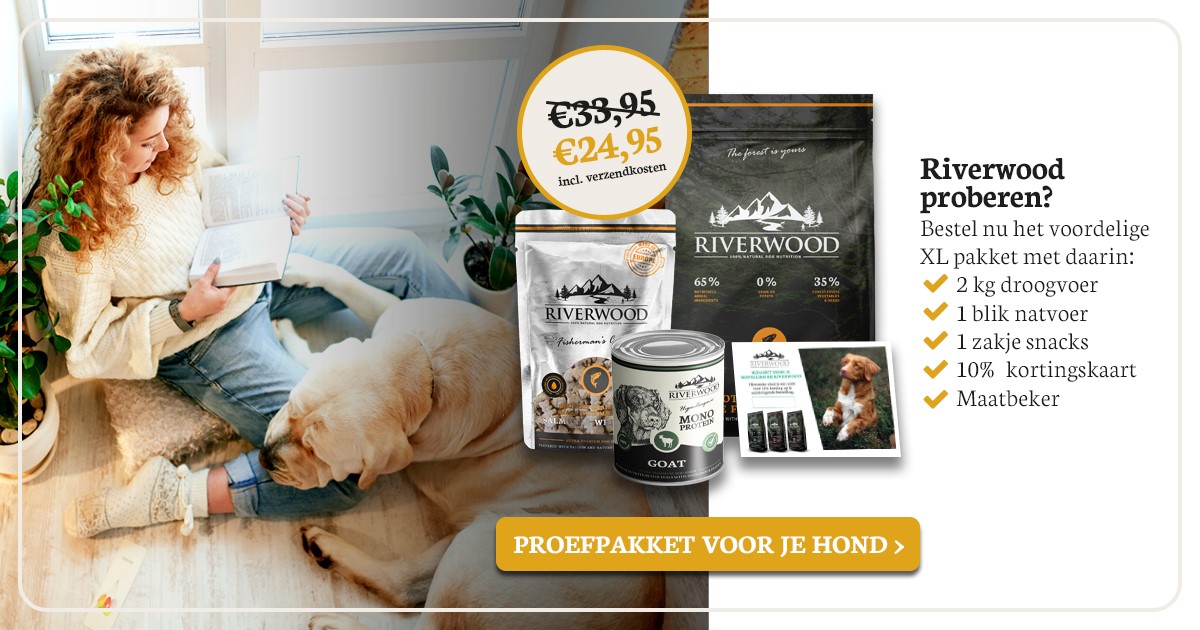The right food for your puppy: what to look out for?
When you welcome a new, little four-legged friend into your family, there are quite a few things to consider. How often and how long should a puppy sleep, how long can he walk, what (coat) care does he need and perhaps one of the most important questions; how and what should you feed a puppy? Especially with regard to the right food, there can still be some confusion. In the blog below, we will elaborate on the most important things you need to know about proper puppy feeding.

What should you feed a puppy?
It is important for puppies to be fed specific foods specially formulated for them so that they can develop optimally and grow up healthy. Puppies, in fact, have different nutritional needs than adult dogs. For example, puppies need more protein, which is essential for a young dog's growth. Because a puppy needs "fuel" for growth, puppy food contains more fats than standard food for adult dogs. These fats provide a puppy with the energy needed for growth. In addition, the calcium/phosphorus ratio is adjusted in puppy food, both minerals are needed for proper and even building of strong bones. Puppies need proportionally more calcium and phosphorus than adult dogs (adult: minimum 1.25 g per 1,000 kcal/ME, puppy: minimum 2 to 2.5 g per 1,000 kcal/ME). However, puppies cannot yet excrete excess calcium, which can lead to joint problems and deformities. Therefore, it is very important to include these minerals in the correct proportions and amounts in the diet. Finally, the size of kibble in puppy foods has been changed: the kibble is smaller than kibble for adult dogs so that puppies can chew and swallow it more easily.
In addition to food, you can also spoil your puppy with reward candy or other snacks. Just make sure that these treats are suitable for puppies. Riverwood semi-moist snacks and crunchy snacks are suitable for dogs of all breeds aged at least 10 weeks. View the full range of reward snacks here.
Do you have a slightly older puppy who won't turn his paws away from a tasty chew? Riverwood's chewy snacks are also suitable for puppies 4 months and older. View the full range of Butcher Shop Series chewy snacks here.
How much food should your puppy get?
At first, it can be difficult to determine the right amount of food your puppy should be given. Every puppy food has guidelines on the package which are usually based on the estimated adult weight of the dog. Note that this is the daily recommended amount of food without any snacks included.
In addition, keep in mind that every puppy is different. Therefore, the daily recommended amount of food is only a guideline. Do you have the idea that your pup is hungry or perhaps is getting too much food? Then adjust the amount of food, but do not deviate too much from the daily recommended amount of food in order to prevent the dog from lacking essential nutrients. Finally, also keep a close eye on the puppy's stool.
How often should you feed a puppy per day?
Puppies need several meals a day compared to adult dogs. A puppy is in the midst of growth, so they use up the energy from food faster. As a result, they also need new fuel faster than adult dogs. Puppies younger than 6 months are best fed 4 meals a day. Puppies older than 6 months should only be given 3 meals a day. When you switch your four-legged friend to food for adult dogs, you may reduce the amount of meals one more time. Adult dogs get 2 meals a day.
Which food is best for your puppy?
The choice of puppy food is vast. Which puppy food is best for your puppy depends on the puppy's age and breed size. Up to the age of three months, every dog gets puppy food, but if you have a larger breed puppy, after three months they may switch to junior large breed food. The reason for this is that large breed puppies again have different nutritional needs than small or medium breed puppies. This is because it is important for larger breed puppies not to grow too fast in order to reduce the risk of enostosis (growing pains). In this blog, we explain the difference between puppy food and junior large breed food.
Riverwood's range includes both Puppy food and Junior Large Breed food. Both varieties contain a high percentage of meat from three unique protein sources and -like all the foods in our range- are completely grain and gluten free. This also makes these foods suitable for dogs with food allergies or intolerances. The Riverwood Puppy and Junior Large Breed foods are highly digestible and contain all the nutrients your puppy needs to grow into a healthy adult dog.
Lots of dogs already enjoy Riverwood every day. Would you also like your dog to feast on our delicious foods and are you curious which variety would suit your dog best? Then answer a few questions here and order an inexpensive sample pack right away.




